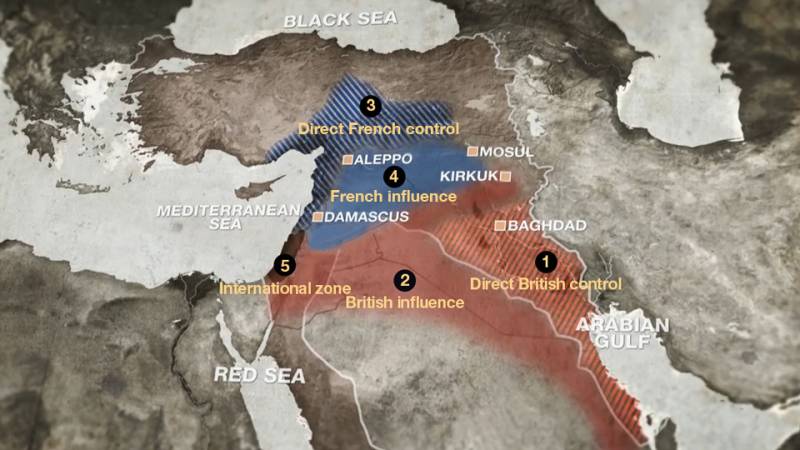
That the seed of all conflict began in a cave
When man, like the wild wolf had to prove he was brave.
No hope for human brotherhood with one world, one race, one rule
We die from too much knowledge and the greediness of a fool
Extract from Tom Zart’s Poem “Seeds of Conflict and Greed”
The story goes back to a time, when two diplomats, one British - Sir Mark Sykes - and one French - François Georges-Picot - decided the fate of 470 million Arabs living today in divided and stranded areas, full of conflict and disputes. The agreement divided the Middle East into multiple zones of influence. The agreement became a haunting legacy of the colonial era, still tormenting the Middle East due to unjustly division of land between the Arabs, Kurds and various other minorities living in the region today. The agreement, signed in 1916, was a secret pact between Britain and France to divide the Ottoman Empire's territories in the Middle East into spheres of influence after World War I. The agreement drew artificial borders that cut across traditional ethnic and religious boundaries, creating countries that later struggled to establish coherent political identities. As per the initial settlement, the coastal regions of Syria and Lebanon was given to France, while Britain had control over present-day Iraq and the area that includes Israel, Jordan, and the Palestinian territories. The agreement also included provisions for international control of the city of Jerusalem and the surrounding area.
The system that emerged from the final phase of the war and peace-time diplomacy was quite different from what Sykes and Picot had envisioned. Firstly, Palestine on both banks of the Jordan River became a British Mandate on behalf of the League of Nations. This was due to the Balfour Declaration of 1917, which promised British support for a Jewish national home in Palestine. The British Mandate over Palestine lasted from 1920 until 1948 when Israel declared its independence. Secondly, as part of an agreement between Lloyd George and Clemenceau, Mosul and northern Iraq were transferred from the French to the British area of control and were incorporated into the Kingdom of Iraq. This move helped to consolidate British control over Iraq, which was declared an independent state in 1932. Thirdly, Britain gave France a free hand in the area it acquired, which the French used to expand the area of Lebanon at Syria’s expense and divide Syria into several states. This division led to the creation of modern-day Lebanon, Syria, and parts of Iraq, and was a source of ongoing political and social tension in the region. Fourthly, Britain created the Emirate of Transjordan to placate the unhappy Abdullah, who had been promised control over a united Arab state. Transjordan was detached from Mandatory Palestine, and Abdullah became its first emir. Later, in 1946, Transjordan became an independent state and was renamed Jordan. Finally, the province of Alexandretta on the Turkish-Syrian border was given a special status and was eventually ceded by France to Turkey on the eve of World War II. This move was seen as a betrayal by many Syrian nationalists who saw Alexandretta as an integral part of Syria.
The system that emerged from the final phase of the war and peace-time diplomacy was quite different from what Sykes and Picot had initially thought. The partitioning of the Ottoman Empire had far-reaching consequences for the Middle East and continues to shape the region's politics and society today.
Looking back, the actions and events that led to the creation of the modern states of Syria, Iraq, and Lebanon are often seen as an egregious manifestation of European colonialism at its worst. The names given to these states were based on historic and geographic terms, but the reality on the ground was often much more complex. The creation of Greater Lebanon, for example, undermined the coherence and durability of the smaller Lebanese entity.
Meanwhile, the imposition of a Sunni royal family on Iraq, which had a Shiite Arab majority and a large Kurdish minority, created instability that has persisted to this day. The policy of divide and rule in Syria also hindered the emergence of a unified Syrian entity, while the failure to create a clear distinction between an Arab and a Jewish entity in the area on both sides of the Jordan River created ongoing tensions in the region. Furthermore, the Kurds were left without a homeland, which continues to be a source of conflict in the region.
The later rise of pan-Arab nationalism, which emphasized the unity of all Arab states, further complicated the situation, and hindered the recognition of the diversity of the Levant states. Today, the need to recognize and accommodate the patchwork of ethnic and religious groups in the region remains a key challenge. Constructing pluralistic political systems that can accommodate this diversity is crucial to addressing the ongoing turmoil in the region.
The agreement is criticized for its arbitrary nature and its disregard for the region's social and cultural complexities. The consequences of this agreement are still being felt today, as many countries in the region continue to face political instability and internal conflicts.
Today, the Middle East is facing a new set of challenges, including civil wars, terrorism, and the rise of extremist groups like ISIS. These challenges have exposed the fragility of the political order created by Sykes-Picot, leading many to question whether it can survive in its current form. The Sykes-Picot Agreement reflected the colonial interests of Britain and France in the Middle East and did not consider the aspirations of the local population. The agreement was eventually implemented, and the division of the Middle East had long-lasting consequences for the region, including the creation of artificial borders, political instability, and ongoing conflict.

